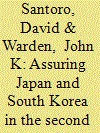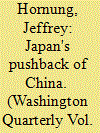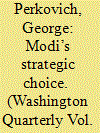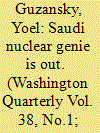|
|
|
Sort Order |
|
|
|
Items / Page
|
|
|
|
|
|
|
| Srl | Item |
| 1 |
ID:
143016


|
|
|
|
|
| Summary/Abstract |
Discussions about the requirements for U.S. extended deterrence and assurance are making a comeback. During the Cold War, U.S. analysts focused primarily on Western Europe, but in recent years the challenges of extended deterrence and assurance have been starker in Northeast Asia. Discussing the requirements for U.S. extended deterrence and assurance involves asking how the United States can deter its adversaries and assure its allies. In both cases, the critical factor is perception. According to analysts Clark Murdock and Jessica Yeats, “In the same way that deterrence must be tailored to each actor, situation, and form of warfare, assurance must be tailored to the strategic culture, threat perceptions, values, and specific concerns of each ally.”
|
|
|
|
|
|
|
|
|
|
|
|
|
|
|
|
| 2 |
ID:
143014


|
|
|
|
|
| Summary/Abstract |
As the Obama administration's tenure winds down and the United States withdraws nearly all of its troops from Afghanistan, debates about the nature and scale of future U.S. involvement in Afghanistan continue. President Obama has committed to withdrawing all but a minor residual force by the end of 2016. On the other hand, Afghan President Ashraf Ghani has called for a sizeable U.S. military presence long after President Obama leaves office, and recent setbacks in Iraq have strengthened the hand of Congressional leaders, U.S. military officers, and others who call for an enduring commitment.
|
|
|
|
|
|
|
|
|
|
|
|
|
|
|
|
| 3 |
ID:
143018


|
|
|
|
|
| Summary/Abstract |
Even as events in Iraq, Syria, and Ukraine have captured the attention of U.S. foreign policy elites, the United States faces key questions about its military position in Asia. In the face of growing Chinese power, can the United States continue to provide a credible deterrent in Asia without either bankrupting itself or pursuing risky strategies that raise new questions about crisis stability? While other security issues remain important, none will have a more fundamental effect on the U.S. military budget or the way the United States does business overseas.
|
|
|
|
|
|
|
|
|
|
|
|
|
|
|
|
| 4 |
ID:
143007


|
|
|
|
|
| Summary/Abstract |
The middle class is always rising. Many of us who studied European history may remember that saying with a certain fondness. Whether the course was on medieval, early modern, or late modern European history, one inevitable topic was the rising middle classes. They were behind just about everything important in Europe's development—the growth of the city-states, the English civil war, the French Revolution—to name just a few. Now fast forward to the twenty-first century, and it is the global middle class we’re all talking about as “emerging,” or rising. Ironically, it is rising at a time when the middle classes in the United States and Europe seem to be declining! For once, it doesn’t seem like “plus ça change,” but something new that is afoot
|
|
|
|
|
|
|
|
|
|
|
|
|
|
|
|
| 5 |
ID:
143017


|
|
|
|
|
| Summary/Abstract |
Bilateral relations between China and Japan are in a state of disrepair.1 The current nadir began on September 7, 2010, when the Chinese fishing trawler Minjinyu 5179 collided into two Japan Coast Guard vessels in waters near the Japanese-administered Senkaku Islands (Pinnacle Islands in English). Following the arrest of the captain, Beijing cancelled meetings and cultural exchanges, demanded apologies as well as compensation for holding him, and repeatedly summoned Japan's ambassador. Beijing even restrained Japan-bound rare-earths’ exports and subjected many Japanese imports to lengthy customs inspections. Subsequent events sunk ties to new lows, including Tokyo's September 2012 purchase of three of the Senkaku Islands from their private Japanese owners and Beijing's November 2013 declaration of an expansive Air Defense Identification Zone (ADIZ) that overlaps considerably with Japan's (including the Senkakus). Peppered in-between have been derisive statements by officials, for example when their ambassadors to the United Kingdom compared each other's country to Lord Voldemort, the antagonist in the Harry Potter series, in dueling January 2014 op-eds in Britain's The Telegraph.
|
|
|
|
|
|
|
|
|
|
|
|
|
|
|
|
| 6 |
ID:
143008


|
|
|
|
|
| Summary/Abstract |
Indian decision makers face a strategic conundrum: how to deter and/or respond to future terrorism emanating from Pakistan. The dilemmas are manifold: punitive action may assuage the desire of an angry public for revenge, but too heavy a response may motivate actors in Pakistan to escalate attacks in India; while a weak riposte is unlikely to convince Pakistan’s civilian and military leaders to alter their long-standing embrace of conflict against India by proxy. Both the Atal Bihari Vajpayee and the Manmohan Singh governments faced this conundrum in January 2002 and November 2008, respectively, following the attacks by Pakistan-based militants in Delhi and Mumbai. Both chose to exercise restraint rather than strike back.
|
|
|
|
|
|
|
|
|
|
|
|
|
|
|
|
| 7 |
ID:
143011


|
|
|
|
|
| Summary/Abstract |
What if nuclear aspirants get the bomb? How likely are they to use it? Which nuclear strategies might emerging nuclear powers adopt? These may seem like academic questions, but they are loaded with strategic significance. Different nuclear strategies have historically been associated with distinct types of risk. Some nuclear strategies are more likely to deter U.S. freedom of action; some more sharply increase the risk of accidental or unauthorized nuclear use. The type of nuclear posture or strategy a state is likely to choose, then, ought to affect the price the international community is willing to pay to stop or rollback emerging nuclear powers. These questions merit urgent answers. North Korea is believed to have at least a rudimentary plutonium-based nuclear weapons capability, is presently assessed to have a uranium enrichment capability to expand its fissile material stockpile, and periodically threatens to restart its plutonium production pathway. The international community is intensively trying to prevent Iran from achieving a nuclear weapons capability based on uranium enrichment. Much policy and academic energy has centered on trying to prevent the spread of nuclear weapons. But if these efforts fail, what next? Which nuclear strategy might these states choose?
|
|
|
|
|
|
|
|
|
|
|
|
|
|
|
|
| 8 |
ID:
143013


|
|
|
|
|
| Summary/Abstract |
A nuclear deal with Iran—Saudi Arabia's regional rival—was always going to be unwelcome news in Riyadh, as it means that Tehran receives international recognition as a nuclear threshold state. Saudi Arabia views a deal as an increase in Iran's power at Saudi expense. Even before any broad outlines for an agreement were in place, though, the negotiations themselves placed Iran on par with the world's leading superpowers. Which is exactly why Saudi Arabia made contingency plans to keep pace with Iran. In recent years, Riyadh has accelerated its own civilian nuclear development in response—a move that might undermine U.S. nonproliferation endeavors—but will make sure the Kingdom can match any nuclear capabilities Iran is allowed to maintain as part of any final nuclear deal with world powers.
|
|
|
|
|
|
|
|
|
|
|
|
|
|
|
|
| 9 |
ID:
143010


|
|
|
|
|
| Summary/Abstract |
The failure of the security assurances contained in the 1994 Budapest Memorandum to prevent Russia's annexation of Crimea and support for eastern Ukrainian separatists has been widely viewed as a serious blow to global nuclear nonproliferation efforts. In particular, observers have maintained that the experience will undermine the future value of security assurances in persuading countries to give up nuclear weapons capabilities or to continue refraining from acquiring them. Observers have also asserted that the experience will reinforce the lesson learned from such previous cases as Iraq and Libya that giving up nuclear weapons or nuclear weapons programs will make a country vulnerable to military attack.
|
|
|
|
|
|
|
|
|
|
|
|
|
|
|
|
| 10 |
ID:
143015


|
|
|
|
|
| Summary/Abstract |
“Let me reiterate that our treaty commitment to Japan's security is absolute,” declared President Barack Obama in Tokyo in April 2014. “Article 5 covers all territories under Japan's administration, including the Senkaku Islands,” he continued, referring to the part of the alliance whereby the United States promises to provide military aid to Japan if it is attacked.1 Days later, the President announced a new basing agreement in Manila, affirming Washington's commitment to help “build the Philippines’ defense capabilities,” calling it a “vital partner” in maritime security.2 These two presidential statements underscore an increasingly salient set of regional policy quandaries. Maritime and territorial disputes in the Pacific have become prominent in recent years and, when U.S. allies are involved, they present a unique challenge to extended deterrence in the region—one with which Washington is only beginning to grapple.
|
|
|
|
|
|
|
|
|
|
|
|
|
|
|
|
|
|
|
|
|